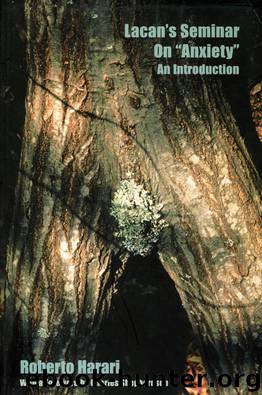Lacan's Seminar On Anxiety by Roberto Harari

Author:Roberto Harari [Harari, Roberto]
Language: eng
Format: epub
ISBN: 978-1-59051-655-3
Publisher: Other Press
Published: 2013-03-25T16:00:00+00:00
Consequently, anxiety occupies an intermediary position, like a hinge, between jouissance and desire. And failure? Failure is the efficient instrument of anxiety, given that success can have the same function as the one assigned to “satisfy” demand in its periodic manifestation: it can stop up and even asphyxiate desire. And here we find an interesting paradox: the subject must fail, necessarily, so that its desire is not suffocated. Maybe a condition of necessity is, strictly speaking, not the most adequate, though Freud’s text does invite this reading since he refers to the need for punishment as being equivalent to the unconscious feeling of guilt. This point makes it possible to understand the action of a decisive instance in this subjective position: the superego. It is the superego that leads to failure but not in the manner of failure through failure itself. This has consequences for clinical practice and even ethical ones that become immediately apparent.
The analyst can, as he is often advised to do, push the analysand to win out over the rigors of his superego and allow him to work, leaving aside certain unjustified scruples and not being overly exigent of himself. In this picture, the analyst acts like a bellows blowing a teacherly air over the patient, proposing thereby a lesson in the art of living well. Faced with this “action,” the analysand has no other recourse to sustain his desire than to exacerbate the functions of failure. This procedure also usually leads to something else: the analysand is left with no way out to sustain his desire than to pass to the act, manifesting itself in this case by giving up the analysis. When this jump off the stage occurs, the analyst alleges that the patient’s superego has punished the subject with a categorical directive to leave analysis. He may even add that everything is due to the fact that the analysand “does not even allow himself to be cured.” This may seem like a caricature but it can be seen in our area, and there continue to be those with an entire theoretical and clinical practice line that conceives of something like a sadistic superego continually mistreating the masochistic ego. These concepts are set up—as Enrique Pichon-Rivière would say—like a soccer field in the head where two teams are fighting for control, but in a very special way: one of the teams asks the other to attack it but does nothing to defend itself or attack back. This is a spurious manner of grasping some crucial phenomena of analysis where the fallacious “therapeutic ambition” denounced by Freud prevails.
In the seminar D’un Autre à l’autre of 1968–1969, Lacan discusses, in particular, the most usual aspect of masochism, which can often be seen in clinical practice. This is not the erogenous masochism postulated by Freud, that is, masochism consummated by and in perverse erogeneity. Nor does he mention the other variation, known in Freud’s texts as feminine masochism—which, obviously, is not exclusive to some “essence” from women but rather is generated by and in men’s phantasies.
Download
This site does not store any files on its server. We only index and link to content provided by other sites. Please contact the content providers to delete copyright contents if any and email us, we'll remove relevant links or contents immediately.
The Art of Thinking Clearly by Rolf Dobelli(10489)
The 5 Love Languages: The Secret to Love That Lasts by Gary Chapman(9815)
Mindhunter: Inside the FBI's Elite Serial Crime Unit by John E. Douglas & Mark Olshaker(9341)
Becoming Supernatural by Dr. Joe Dispenza(8217)
Nudge - Improving Decisions about Health, Wealth, and Happiness by Thaler Sunstein(7706)
The Road Less Traveled by M. Scott Peck(7603)
Mastermind: How to Think Like Sherlock Holmes by Maria Konnikova(7345)
Enlightenment Now: The Case for Reason, Science, Humanism, and Progress by Steven Pinker(7313)
Win Bigly by Scott Adams(7197)
The Way of Zen by Alan W. Watts(6614)
Factfulness: Ten Reasons We're Wrong About the World – and Why Things Are Better Than You Think by Hans Rosling(4742)
The State of Affairs by Esther Perel(4719)
Gerald's Game by Stephen King(4654)
Man's Search for Meaning by Viktor Frankl(4605)
The Confidence Code by Katty Kay(4260)
Thinking in Bets by Annie Duke(4226)
The Healing Self by Deepak Chopra(3578)
Hidden Persuasion: 33 psychological influence techniques in advertising by Marc Andrews & Matthijs van Leeuwen & Rick van Baaren(3565)
The Worm at the Core by Sheldon Solomon(3487)
